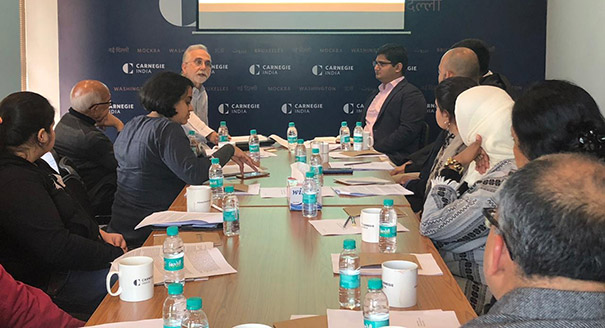Registration
You will receive an email confirming your registration.
Despite urban cities in India being hotspots of wealth and income, they face structural and service delivery challenges due to a lack of financial resources within the system. In his upcoming paper, “Municipal Finance Systems and Processes: Reflections on Current Issues in India,” Matthew Glasser, director of municipal law and finance at the Center for Urban Law and Finance in Africa, presents an overview of the overarching issues related to municipal finance in India.
Carnegie India hosted a private roundtable discussion, with Matthew Glasser, on municipal finance systems in India, focusing on factors that constrain effective and financially sustainable urban local bodies. The discussion was moderated by Anirudh Burman, senior research analyst at Carnegie India, and covered constitutional, legal, and structural issues that affect the functioning of municipalities. Taking into account the seventy-fourth Amendment of the Indian constitution—which aimed to strengthen urban local bodies—the roundtable focused on the administrative structure of municipalities, and their relationships with the center and state governments.
DISCUSSION HIGHLIGHTS:
- Structural Weaknesses of Urban Local Bodies (ULBs): Participants stated that the new wealth being generated by the substantive economic growth of urban areas is not being taxed effectively, leading to inefficiencies within public services, such as transport, sanitation, water, and electricity. The participants stated that the mismanagement of urban funds by state governments—such as the redistribution of urban funds to appeal to, and secure votes from, rural populations—further emphasizes the existing structural weaknesses of ULBs. Participants agreed that there is a need for effective fiscal decentralization to ULBs, and discussed the political and economic issues in implementing such reforms. They affirmed that for a sustainable and measured transformation of ULBs, it is necessary to increase the centralization of the state, thus ensuring higher levels of accountability.
- Issues of Core Municipal Finance: Participants asserted the importance of stable decision-making at the local level, which enhances the accountability between a municipality and its citizens. The participants also explored the need to create a system for the distribution of funds to poorer populations. They noted the need to take into account poverty levels (based on average household expenditure) and population distribution, to ensure the appropriate allocation of funds to a larger percentage of the financially disadvantaged population.
- Taxation System: Participants acknowledged that the Goods and Services Tax (GST) has replaced many older transaction taxes that were used to fund municipalities. They discussed the potential for utilizing property tax—the usual medium by which most municipalities collect finances for their functioning. Though they discussed the ways by which municipal associations could encourage higher property tax collections, the participants acknowledged that these increased tax collections could be limited by certain interest groups around existing governance structures, as they have an interest in keeping these taxes low.
- Drivers of Change: Participants identified three potential drivers of change—individuals (middle-class city-dwellers), groups (municipal associations), and the state (local governments). They further discussed the lack of adequate civic and municipal-level associational bodies to look after the interests of municipalities, in contrast to many other countries, where such institutions support municipal governments and act as oversight mechanisms.
- The Road Ahead: Participants examined the need for centralized power, emphasizing individual city interests. They recognized the significance of clear and transparent budgets, along with the management of incentives, including sustainable adaptive responses. One of the solutions discussed by the participants was for state governments to provide a share of GST and other revenues to their ULBs in a transparent and reliable manner. The participants agreed that the assurance of stable funding from higher levels of government would also lessen the financial challenges faced by municipalities. They discussed how, for the funding to be effective, resources for both capital and operational expenditure need to be provided. Participants agreed that municipalities would benefit from stable and unconditional transfers, allocated in proportion to revenue.
This event summary was prepared by Upasana Sharma and Sarah Allan, research interns at Carnegie India.
